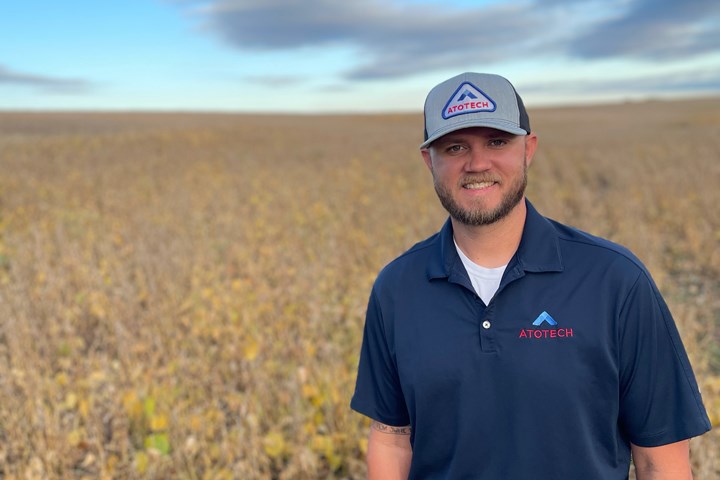An Interview with Caleb Morrison, Atotech
Caleb Morrison, ConAg Regional Sector Leader for Atotech, discusses platings and coatings in the construction and agricultural markets.

Caleb Morrison is the ConAg Regional Sector Leader for Atotech.
Photo Credit: Atotech
Caleb Morrison got his start with Atotech (Rock Hill, S.C.) about 10 years ago, specializing in developing wear-resistant coatings with an emphasis on construction and agriculture. He quickly rose to managing the sales and implementation of new technology and was recognized in Products Finishing’s 40 Under 40 Class of 2018. Today, Morrison is the company’s ConAg Regional Sector Leader — a role that he says is the first of its kind and is part of a larger sector strategy. He says the position doesn’t necessarily take a direct sales approach but acts in more of an advisory capacity. PF recently sat down with Morrison to hear about his passion for the construction and agricultural sectors.
What does your position entail?
The idea was that instead of direct sales it’s about working with the OEMs, kind of bridging the communications gap from chemical supplier to applicator or fabricator to the OEM. It’s more like a partnership, consultant or advisory role.
I open communication within companies like Bobcat, AGCO, Caterpillar, John Deere, CNH — whoever it may be — and I work with those OEMs to understand what troubleshooting problems they are having. For example, if they're having some rusting issues on a certain piece of machinery, we take a look to see if the specifications are up to date with today’s technology.
Another example, a lot of people are still stuck on standard acid zinc or alkaline zinc on their fasteners. Yet in high corrosion areas, you have the ability to do zinc-nickel with another layer stack, which would be like a zinc-nickel with a zinc flake type coating — and they are not even aware of those possibilities.
In addition, hexavalent chrome for hard chrome applications is being heavily watched, as well as for decorative chrome. Many OEMs aren’t even aware that there are alternatives such as trivalent hard chrome and trivalent decorative chrome, just because they just don’t have that line of communication to the applicators and the chemical suppliers. The industry is going to be shifting from an environmental standpoint and we want to make sure we help companies prepare.
Tell us about the launch of the program.
It was something that I specifically talked to my top management about in 2017. It’s very hard to go to sales management and say, “Hey, I need you to pay me a salary, and I’m not going to be selling anything.” So, it was a difficult sell at first, but our management understood the importance of more of a partnership role. They kind of let me run with it from there. Once I got in touch with the correct OEM contacts, I was able to assist their engineers with difficult industry challenges from paint treatment, coating warranty claims — whatever it may be.
And that’s important because there’s definitely going to be some changes coming down the pipeline for all sorts of construction and agriculture OEMs in terms of plating and corrosion protection qualification standards.
What trends are you watching in the industry?
With growing interest in moving to electric we’ve been working to take the expertise that Atotech has partnering with automotive companies on EVs and apply it to the construction and agriculture industries.
It seems like your core mission is trying to help people get the right solution. What motivates you?
The thing that’s really motivated me to take on this role is that I grew up in the Midwest, where agriculture is everywhere. It’s a big market and it’s growing by anywhere from 4-6% every year.
What I like about the challenge is to step outside of that traditional sales role and use my skill set to help people. I like problem-solving, I like technical troubleshooting, and I also enjoy just knowing about all the coatings that are out there. It’s a fun challenge for me, whenever these folks call in needing help. It’s almost like a puzzle.
Plus, it’s been rewarding for me, because I get to work with these construction and agriculture companies that have always been in my life, growing up. Now, when I see that machine out working in a field, I know that I played a part in helping get the right coating on that piece of equipment.
Related Content
Mix of Automation and Skilled Employees Generates Quality
This Pennsylvania plating company’s general manager shares insights about being recognized as a Top Shop for several consecutive years as well as his thoughts about automation, customer service, hiring skilled workers, the challenges of installing a new line and more.
Read MoreConcrete Reinforced Bars Built to Last
Not all corrosion-resistant materials for infrastructure are created equally. Epoxy-coated steel rebar has advantages that other materials used to prevent corrosion do not.
Read MoreFinishing Systems Provider Celebrates 150 Years, Looks to Future
From humble beginnings as an Indiana-based tin shop, Koch Finishing Systems has evolved into one of the most trusted finishing equipment providers in the industry.
Read MoreCuring Oven Basics
Simply heating up the substrate does not cure the coating. There are many variables to consider when choosing the best cure oven for your application...
Read MoreRead Next
Interview with Remington Schieffer, field services supervisor, Dynapower
Products Finishing sits down with 40 Under 40 Class of 2021 inductee Remington Schieffer to hear how he approaches his work and his thoughts on the finishing industry.
Read MoreAn Interview with Michael Feldstein, Surface Technology Inc.
Surface Technology Inc. president Michael Feldstein discusses his company’s capabilities, core values and the philosophy that has helped it achieve Top Shops recognition.
Read MoreAn Interview with Jason Ray, Paperless Parts
Jason Ray, CEO and co-founder of Paperless Parts, discusses trends in manufacturing and solutions that may help finishers streamline the ways they work with machine shops and fabricators.
Read More














.jpg;maxWidth=300;quality=90)







